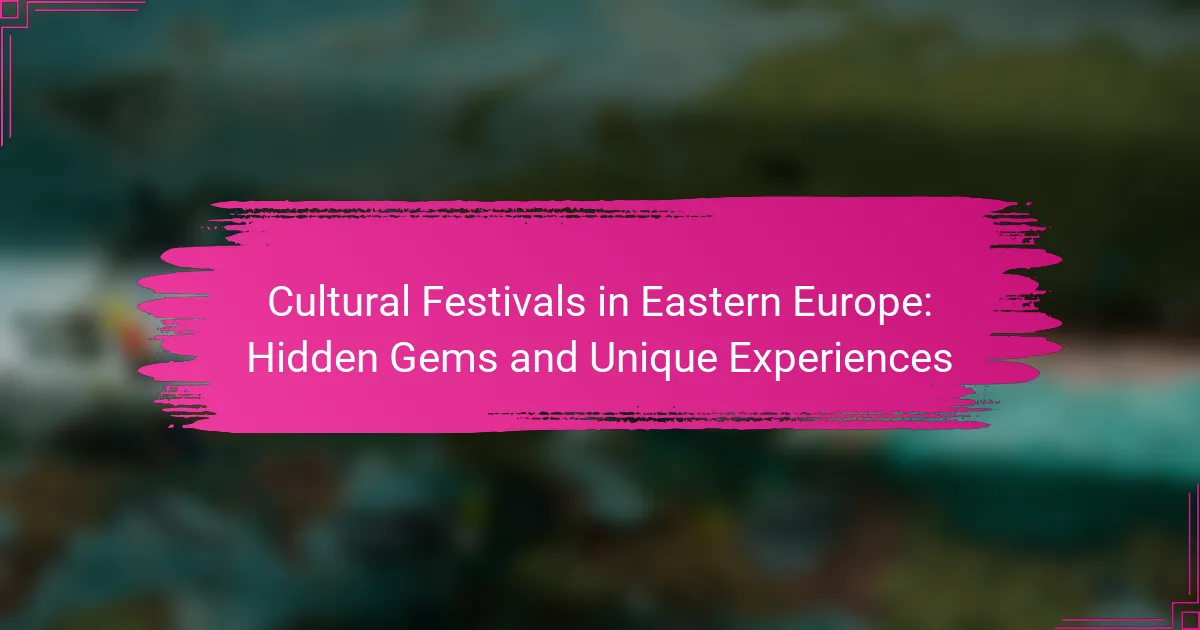Eastern Europe is home to a myriad of cultural festivals that highlight the region’s unique traditions, music, and culinary delights. These vibrant events offer visitors an immersive experience into local culture, featuring everything from traditional dishes to captivating performances. To fully enjoy these hidden gems, it’s essential to research festival dates, travel logistics, and local customs, ensuring a memorable journey through this rich heritage.
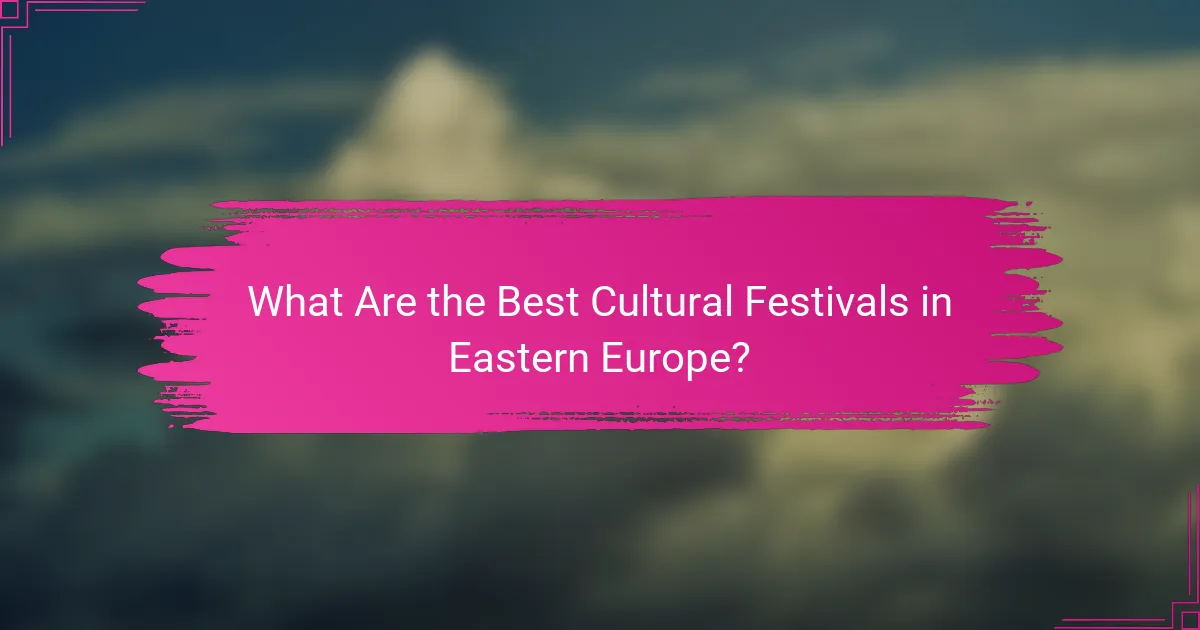
What Are the Best Cultural Festivals in Eastern Europe?
Eastern Europe hosts a variety of cultural festivals that showcase unique traditions, music, and culinary delights. These events provide an excellent opportunity to experience the region’s rich heritage and vibrant community spirit.
Budapest Spring Festival
The Budapest Spring Festival is one of Hungary’s premier cultural events, typically held in April. It features a diverse program that includes classical music concerts, contemporary performances, and visual arts exhibitions, attracting both local and international artists.
Visitors can enjoy performances at iconic venues such as the Hungarian State Opera and the Palace of Arts. It’s advisable to book tickets in advance, as popular shows often sell out quickly.
Wrocław’s Good Beer Festival
Wrocław’s Good Beer Festival, usually held in June, celebrates the craft beer movement in Poland. This festival showcases a wide range of local and international brews, with opportunities to meet brewers and attend workshops.
With hundreds of beers available, attendees can sample everything from traditional Polish lagers to innovative craft ales. Consider purchasing a tasting glass for a more immersive experience, as many breweries offer special tastings.
Tallinn Music Week
Tallinn Music Week takes place in late March and is a significant event for music lovers in Estonia. This festival features a mix of genres, including pop, rock, and electronic music, with performances from both emerging and established artists.
In addition to concerts, the festival hosts discussions and workshops, making it a great platform for networking in the music industry. Tickets can be purchased for individual events or as a festival pass for full access.
Plovdiv International Fair
The Plovdiv International Fair, held in September, is Bulgaria’s largest trade event, showcasing various industries, including arts and crafts. This fair combines business with cultural exhibitions, providing a unique experience for visitors.
Attendees can explore stalls featuring local artisans and traditional Bulgarian products. It’s a good idea to check the fair’s schedule in advance to plan your visit around specific exhibitions or performances.
Riga City Festival
The Riga City Festival occurs in August and celebrates the capital of Latvia with a vibrant mix of music, dance, and art. The festival features street performances, food stalls, and cultural exhibitions throughout the city.
Visitors can enjoy free concerts and participate in various activities, making it a family-friendly event. Arriving early is recommended to secure a good spot for popular performances and to fully experience the festive atmosphere.
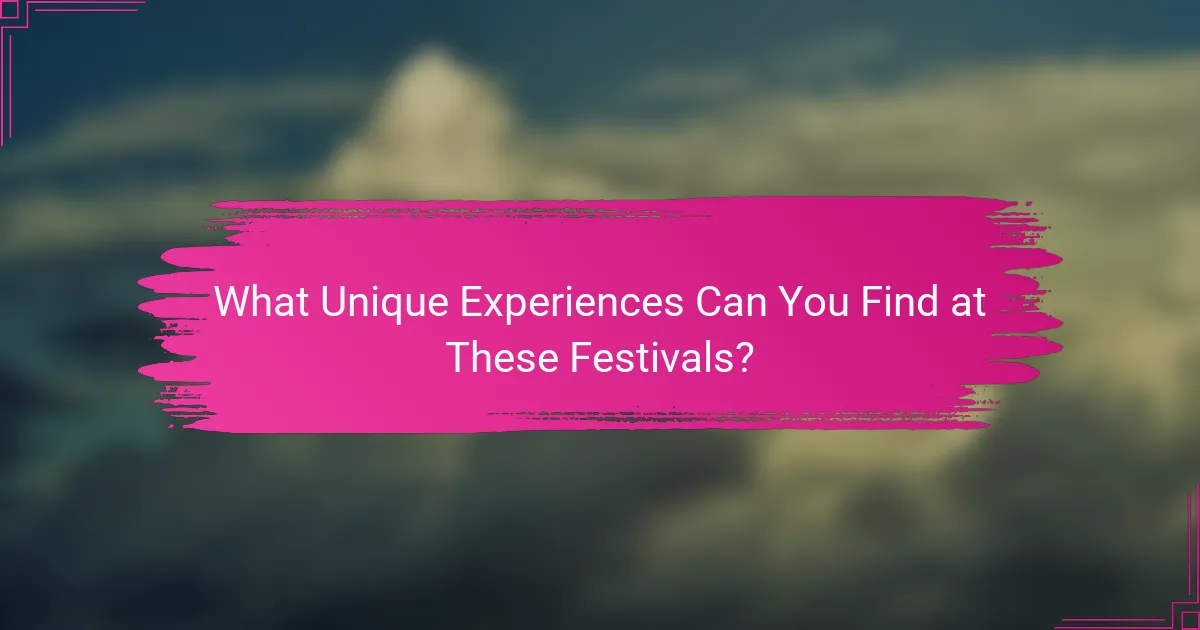
What Unique Experiences Can You Find at These Festivals?
Festivals in Eastern Europe offer a variety of unique experiences that immerse visitors in local culture. From tasting traditional dishes to enjoying live performances, these events provide a rich tapestry of activities that showcase the region’s heritage.
Local Cuisine Tastings
Local cuisine tastings at festivals allow attendees to sample authentic dishes that reflect the region’s culinary traditions. Visitors can expect to find a range of foods, from hearty stews and grilled meats to sweet pastries and artisanal cheeses.
Many festivals feature food stalls run by local chefs and home cooks, providing an opportunity to taste dishes made from seasonal ingredients. Look for specialties like pierogi in Poland or sarmale in Romania, which highlight the unique flavors of each country.
Traditional Music Performances
Traditional music performances are a cornerstone of Eastern European festivals, showcasing folk music that has been passed down through generations. These performances often include local instruments, such as the accordion, violin, and dulcimer, creating a vibrant atmosphere.
Attendees can enjoy both solo artists and larger ensembles, with many festivals offering opportunities for audience participation. Don’t miss the chance to join in traditional dances, which are often an integral part of the music experience.
Art Installations
Art installations at festivals provide a platform for local artists to display their work, often reflecting cultural themes or social issues. These installations can range from large-scale sculptures to interactive exhibits that engage festival-goers.
Many festivals encourage collaboration between artists and the community, resulting in unique pieces that are created on-site. Visitors can often participate in the creative process, making these installations a dynamic part of the festival experience.
Workshops and Masterclasses
Workshops and masterclasses offer hands-on learning experiences led by skilled artisans and experts. These sessions can cover a variety of topics, such as traditional crafts, cooking techniques, and music lessons, allowing participants to deepen their understanding of local culture.
Attendees should look for workshops that fit their interests and skill levels, as many are designed for beginners. Engaging in these activities not only enhances the festival experience but also fosters connections with local culture and community.
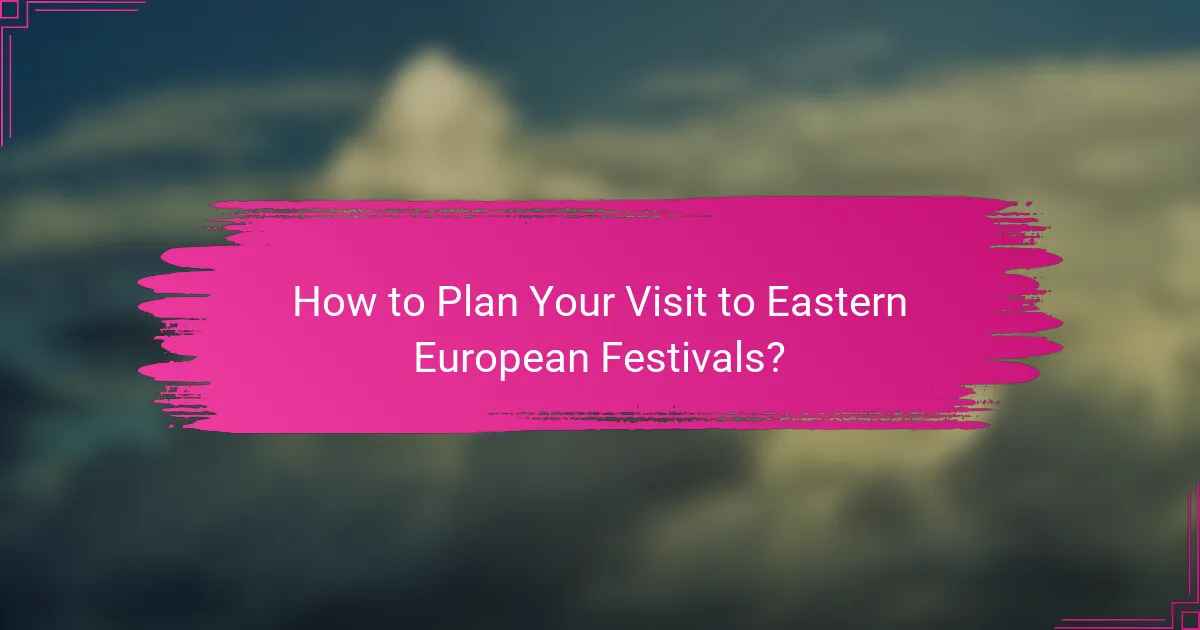
How to Plan Your Visit to Eastern European Festivals?
Planning your visit to Eastern European festivals involves understanding the timing, travel logistics, and accommodation options. Researching specific festivals, their dates, and local customs will enhance your experience and ensure you make the most of your trip.
Best Times to Visit
The best times to visit Eastern European festivals typically align with the spring and summer months, from late April to early September. During this period, many vibrant festivals occur, celebrating local culture, music, and traditions.
For example, the famous Budapest Spring Festival takes place in April, while the Warsaw Summer Jazz Days occur in July. Consider planning your trip around these events to enjoy the local atmosphere and activities.
Travel Tips for Eastern Europe
When traveling to Eastern Europe for festivals, familiarize yourself with local transportation options, such as trains and buses, which are often affordable and efficient. Booking tickets in advance can save you money and ensure you have a spot during busy festival times.
Additionally, learn a few basic phrases in the local language, as this can enhance interactions with locals and improve your overall experience. Be mindful of cultural norms and customs, as they can vary significantly across countries.
Accommodation Options Near Festivals
Accommodation options near festivals range from budget hostels to mid-range hotels and luxury stays. Booking early is advisable, especially for popular festivals, as places can fill up quickly.
Consider using platforms like Airbnb for unique lodging experiences, or check local guesthouses for a more authentic stay. Staying within walking distance of festival venues can save you time and transportation costs.
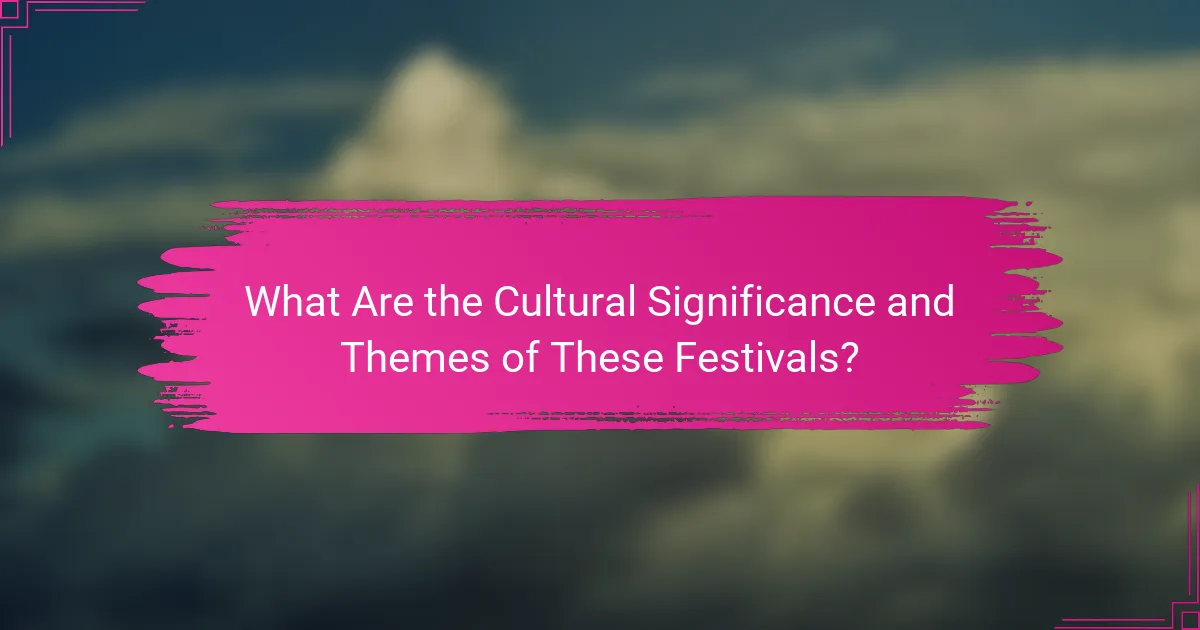
What Are the Cultural Significance and Themes of These Festivals?
Cultural festivals in Eastern Europe hold immense significance, showcasing local traditions, art forms, and community values. They often revolve around themes of heritage, artistic expression, and community involvement, providing a platform for both celebration and education.
Celebration of Heritage
Many festivals in Eastern Europe are rooted in the celebration of heritage, reflecting the unique history and traditions of various regions. Events like the Kupala Night in Belarus or the Maslenitsa in Russia highlight ancient customs, folklore, and seasonal changes.
These festivals often include traditional music, dance, and crafts, allowing attendees to immerse themselves in the local culture. Participating in such events can deepen one’s understanding of the region’s identity and historical context.
Promotion of Local Artists
Cultural festivals serve as vital platforms for promoting local artists and artisans. Events often feature performances by musicians, dancers, and theater groups, showcasing their talents to a broader audience. This not only supports the artists but also enriches the festival experience for attendees.
For example, the Ethno Music Festival in Romania highlights folk music and contemporary interpretations, encouraging collaboration among local musicians. Festivals may also include art exhibitions, providing visibility for local visual artists and craftspeople.
Community Engagement
Community engagement is a core theme of many cultural festivals, fostering a sense of belonging and participation among residents. These events often involve local volunteers and organizations, creating opportunities for collaboration and strengthening community ties.
Festivals may include workshops, discussions, and activities that encourage participation from all age groups. Engaging with the community not only enhances the festival atmosphere but also promotes local pride and social cohesion.
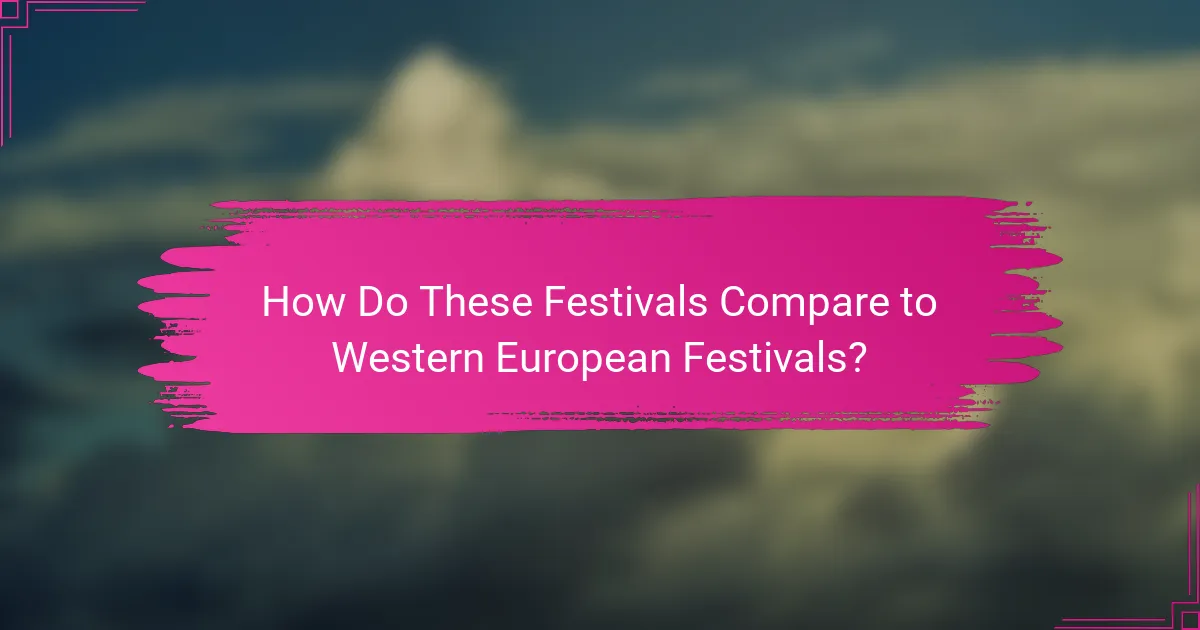
How Do These Festivals Compare to Western European Festivals?
Festivals in Eastern Europe often emphasize local traditions and community engagement more than their Western counterparts, which tend to focus on commercial aspects and larger-scale productions. While both regions celebrate cultural heritage, Eastern European festivals frequently offer more intimate experiences that highlight unique customs and local artistry.
Focus on Tradition and Community
Eastern European festivals typically prioritize local customs and community participation, fostering a sense of belonging among attendees. Events like the Ivan Kupala Festival in Ukraine showcase ancient rituals, folk music, and traditional crafts, allowing visitors to immerse themselves in the region’s rich cultural heritage.
In contrast, Western European festivals often feature international acts and commercial vendors, which can dilute the local flavor. For example, while Oktoberfest in Germany is renowned worldwide, it has evolved into a massive event that attracts tourists, sometimes overshadowing its Bavarian roots.
Accessibility and Affordability
Many Eastern European festivals are more affordable than those in Western Europe, making them accessible to a wider audience. Entrance fees are often low or even free, with food and drink prices typically ranging from a few euros to low tens of euros, allowing visitors to enjoy the festivities without breaking the bank.
In contrast, Western festivals can be significantly pricier, with tickets often costing upwards of €50 or more, plus additional expenses for food and lodging. This difference can make Eastern European festivals an attractive option for budget-conscious travelers seeking authentic experiences.
Unique Experiences and Lesser-Known Events
Eastern Europe is home to numerous lesser-known festivals that offer unique experiences not found in the West. Events like the Maslenitsa Festival in Russia celebrate the end of winter with pancakes, folk games, and vibrant parades, providing a distinct cultural experience.
Western Europe, while famous for events like the Cannes Film Festival or La Tomatina, may not offer the same level of immersion in local culture. Exploring Eastern European festivals can lead to discovering hidden gems that showcase the region’s diverse traditions and artistic expressions.
